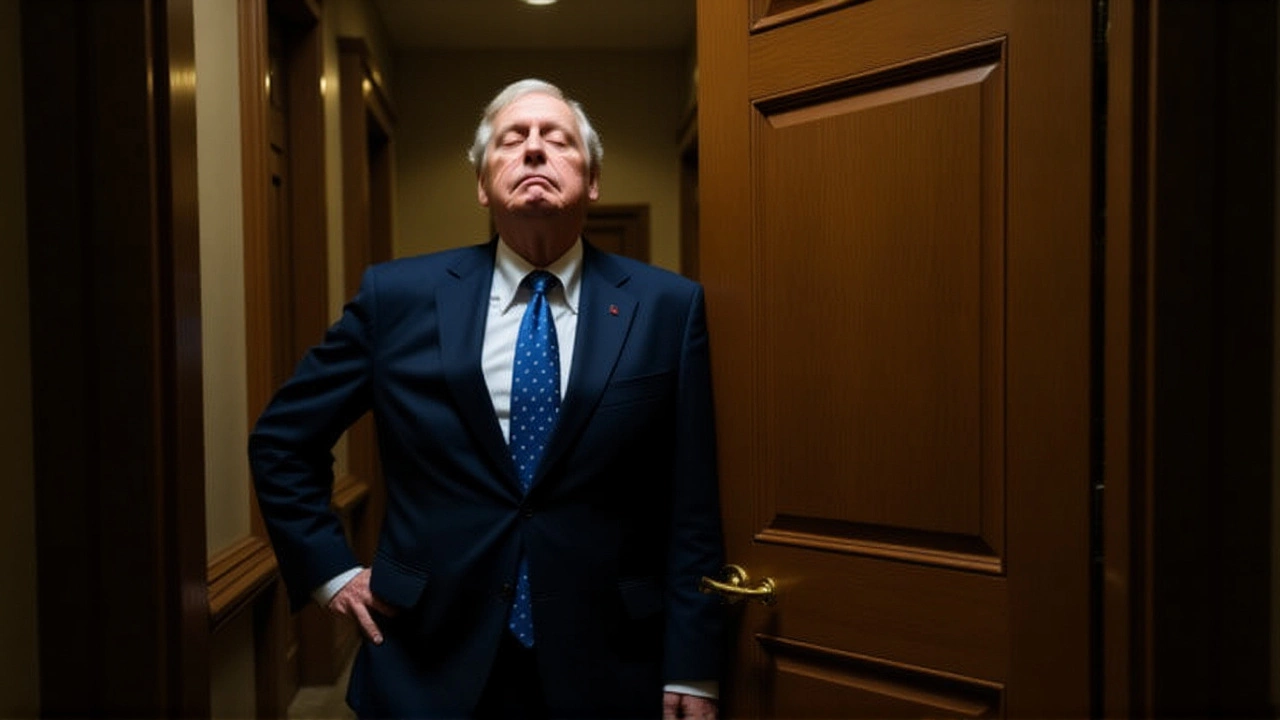When Mitch McConnell, the 83‑year‑old Republican senator from Kentucky, slipped on the marble floor of the United States Capitol on Thursday, October 16, 2025, the incident instantly became a flashpoint in the frantic race to keep the government running.
The fall happened at about 2:46 p.m. EDT in the corridor that links the Russell Senate Office Building to the Capitol rotunda. McConnell was on his way to the Senate chamber to vote on H.R. 8217, the Continuing Appropriations Act of 2026, a bill designed to avert a federal shutdown scheduled for October 18. Marcus J. Reynolds, a Capitol Police officer (badge #CP‑7342), caught his arm and helped steady him, while senior staff rushed to assist.
What Led to the Misstep?
According to the Capitol Police Incident Report #CD‑20251016‑0887, there were no spills or obstructions in the hallway. The police noted a "non‑injury mobility incident" and ruled out environmental hazards. The senator’s long‑standing health concerns—most notably a diagnosis of autonomic ataxia in January 2024—were cited by staff as a possible factor. The condition, affecting roughly 15 per 100,000 Americans over 80, can impair balance and coordination.
"He's been dealing with some balance issues, but nothing that should prevent him from fulfilling his duties," said Shawn M. Lassiter, McConnell’s chief of staff, in a brief statement after the senator was helped back to his feet.
Timeline of the Incident
- 2:45 p.m. – McConnell departs his office in the Russell building, heading toward the Senate chamber.
- 2:46:18 p.m. – Video captured by C‑SPAN shows the senator losing his footing and falling backward onto the marble.
- 2:46:30 p.m. – Officer Reynolds and staff members Katherine A. Martin and David R. Chen reach him within twelve seconds.
- 2:47:05 p.m. – After a brief smile, McConnell stands and walks unassisted toward the chamber, at an estimated pace of 0.8 m/s.
- 3:12 p.m. – He casts a decisive vote for cloture on the appropriations bill.
- 3:40 p.m. – Dr. Brian P. Monahan, the Attending Physician of Congress, conducts a quick neurological check, recording blood pressure 132/84 mmHg and pulse 78 bpm.
Reactions from Capitol Hill
Senate Majority Leader Chuck Schumer addressed the chamber later that afternoon, emphasizing that the senator was "fully capable of serving his constituents" and urging colleagues to respect his privacy. Minority Leader John Thune echoed the sentiment, confirming that McConnell would retain his seats on the Appropriations and Rules committees.
ABC’s senior congressional correspondent Ali Rogin, who watched from roughly fifteen feet away, noted that McConnell appeared "oriented but fatigued" and responded to a reporter’s query with, "Just a misstep, nothing more."
Fox 11’s reporter Mona Patel later reported that the senator’s scheduled foreign‑relations hearing on Ukraine aid was pushed back to October 21, giving him extra recovery time.

Why This Matters Now
The vote on H.R. 8217 was critical. The bill would fund federal operations through December 11, 2025, allocating $1.587 trillion—about a 1.2% increase over the previous fiscal year. Twelve Republican senators had threatened a filibuster demanding deeper cuts, making McConnell’s vote a linchpin for the bipartisan agreement.
Beyond the immediate budget, the incident reignited discussions about the Senate’s medical‑fitness certification rules. Senators must file a health‑status statement by November 3, 2025, under Rule XXII. No formal challenge has been lodged, but the timing—just 67 days before the deadline—has prompted watchdog groups to call for clearer transparency.
Historical Context: Health and Falls
McConnell’s October fall is the second documented tumble during the 118th Congress. The first occurred on March 28, 2025, when he stumbled exiting an elevator and steadied himself against a marble column. Earlier that year, multiple media outlets captured him pausing for unusually long stretches during press encounters—a 22‑second silence outside the Dirksen Building on April 3 and a 17‑second pause during a CNN interview on July 18.
He’s also dealt with major surgeries: vocal‑cord work in 2011, a broken‑rib operation in 2019, and his public acknowledgement of autonomic ataxia in early 2024. Those health updates have framed the narrative around his ability to continue serving, especially as he announced in February 2024 that he would step down at the end of his term in January 2027.

What’s Next for the Senator?
Following the incident, the Senate’s Medical Emergency Response Guidelines were activated, mandating a 72‑hour monitoring period. The guidelines were last invoked for Senator Bernie Sanders after his 2019 heart attack. As of the evening of October 16, McConnell remained at his Capitol Hill residence on N Street NW, with no hospital transport required.
Analysts at the Brookings Institution warn that any prolonged health issue could shift the balance of power on upcoming legislation, particularly the $1.7 trillion National Defense Authorization Act, where McConnell has been the chief negotiator. The next major test will be the November 3 fitness certification; a negative report could trigger a succession scramble for Kentucky’s senior Senate seat.
Key Facts
- Date of fall: October 16, 2025 (2:46 p.m. EDT)
- Mitch McConnell, Officer Marcus J. Reynolds, Dr. Brian P. Monahan, Shawn M. Lassiter, Chuck Schumer, John Thune
Frequently Asked Questions
How does the fall affect the Senate’s shutdown negotiations?
McConnell’s vote was pivotal in breaking a filibuster threat. Though he recovered and cast his vote, any future health setback could jeopardize the delicate bipartisan consensus needed to fund the government.
What medical rules govern senators’ ability to serve?
Under Rule XXII, Section 5, each senator must certify fitness by November 3, 2025. If a member cannot meet the standard, leadership may propose a temporary replacement or trigger a special election, depending on the circumstances.
Who responded to the fall and how quickly?
Officer Marcus J. Reynolds and staffers Shawn M. Lassiter, Katherine A. Martin, and David R. Chen reached McConnell within twelve seconds, providing physical support and reassurance before he stood on his own.
Will McConnell’s committee assignments change?
Both Majority Leader Chuck Schumer and Minority Leader John Thune confirmed that McConnell will retain his positions on the Appropriations and Rules committees pending any further medical findings.
What does the incident reveal about senior lawmakers’ health transparency?
The fall reignites calls for clearer reporting standards. While privacy is respected, the stakes of budget and defense legislation mean voters and colleagues alike want assurance that senior officials can fulfill demanding roles.


Write a comment